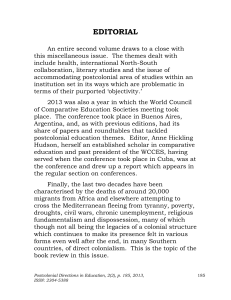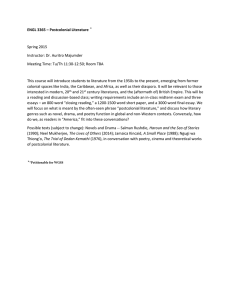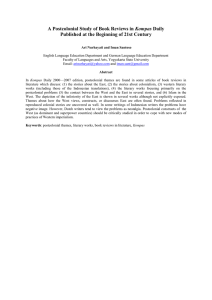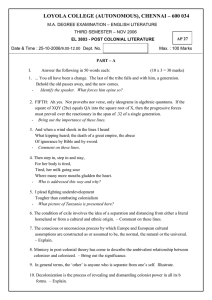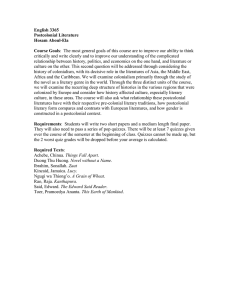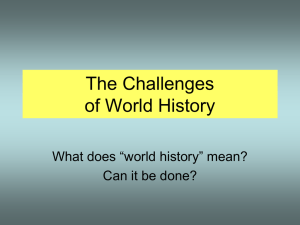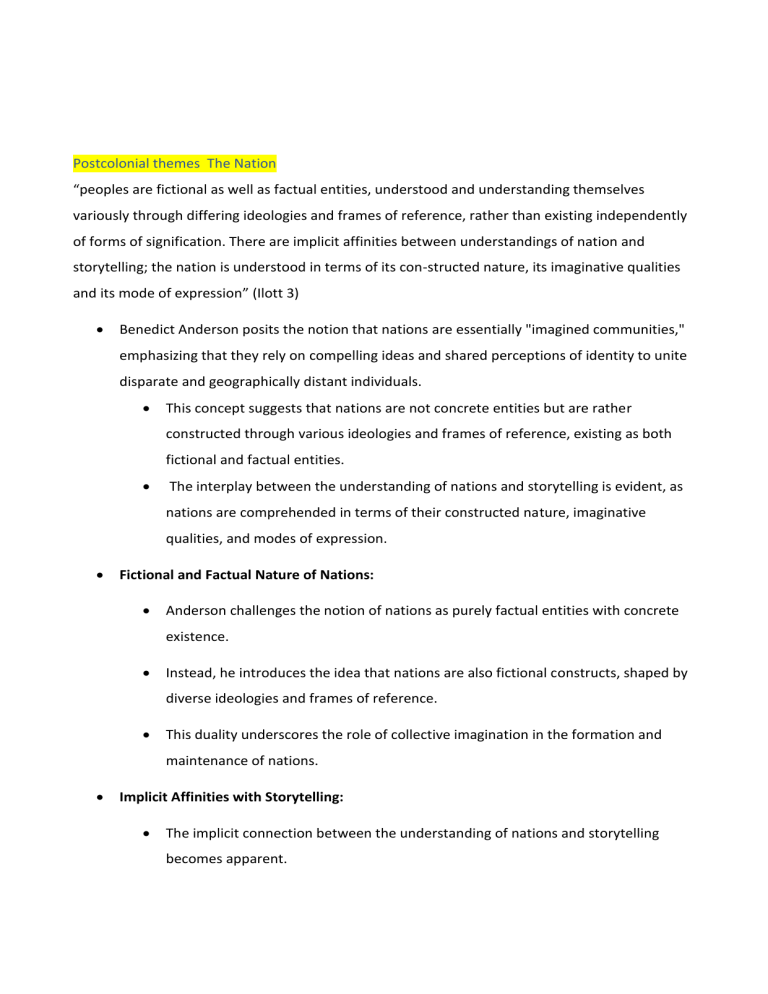
Postcolonial themes The Nation “peoples are fictional as well as factual entities, understood and understanding themselves variously through differing ideologies and frames of reference, rather than existing independently of forms of signification. There are implicit affinities between understandings of nation and storytelling; the nation is understood in terms of its con-structed nature, its imaginative qualities and its mode of expression” (Ilott 3) Benedict Anderson posits the notion that nations are essentially "imagined communities," emphasizing that they rely on compelling ideas and shared perceptions of identity to unite disparate and geographically distant individuals. This concept suggests that nations are not concrete entities but are rather constructed through various ideologies and frames of reference, existing as both fictional and factual entities. The interplay between the understanding of nations and storytelling is evident, as nations are comprehended in terms of their constructed nature, imaginative qualities, and modes of expression. Fictional and Factual Nature of Nations: Anderson challenges the notion of nations as purely factual entities with concrete existence. Instead, he introduces the idea that nations are also fictional constructs, shaped by diverse ideologies and frames of reference. This duality underscores the role of collective imagination in the formation and maintenance of nations. Implicit Affinities with Storytelling: The implicit connection between the understanding of nations and storytelling becomes apparent. Anderson suggests that the narrative quality of storytelling aligns with the constructed nature of nations. Both involve a process of imaginative creation, where shared stories and narratives contribute to the formation of a collective identity. Constructed Nature and Imaginative Qualities: Anderson's assertion that nations are "constructed" emphasizes the intentional and artificial aspects of their formation. This construction involves not only the factual elements but also the imaginative qualities that contribute to a shared sense of identity. The nation is seen as a product of intentional construction rather than an inherent, natural entity. Mode of Expression: The mode of expression is crucial in understanding how nations come into being. Anderson suggests that the nation is expressed through various means, and this expression is integral to its existence. Storytelling serves as one of the primary modes through which the nation is expressed, reinforcing the idea that narratives play a central role in shaping collective identity. Summary: Benedict Anderson's concept of imagined communities introduces a dynamic perspective on the nature of nations. The intersection between the understanding of nations and storytelling emphasizes the role of narratives, shared stories, and modes of expression in the formation and continuity of nations as both factual and fictional entities. In the postcolonial context: the notion of the nation takes on a particularly 'imagined' quality. Independence movements, while often mobilizing nationalist ideals, grapple with the paradox that national boundaries had frequently been arbitrarily imposed by colonial rule. Postcolonial literature frequently engages with the complex question: What does it truly mean to be a member of a nation, especially when the very foundations of those nations were shaped by external forces? Nationalism and Arbitrary Boundaries: o In the aftermath of colonialism, nationalist ideas played a pivotal role in the movements toward independence. o However, the irony lies in the fact that the boundaries demarcating these newly formed nations were frequently determined arbitrarily by colonial powers. o This dichotomy underscores the complex and sometimes contradictory nature of postcolonial national identity. Interrogating National Identity: o Postcolonial literature, as a reflective and critical discourse, often grapples with the profound questions surrounding national identity. o The key inquiry revolves around what binds the people of a nation together, especially when the historical legacy of colonialism has left indelible imprints on the very concept of the nation. Frederic Jameson's Notion of National Allegory: o Frederic Jameson's assertion that, in 'third world' writing, the story of the individual invariably serves as a national allegory reflects a sweeping generalization that has garnered critique. o This proposition suggests that the personal narrative of an individual becomes emblematic of broader national struggles and aspirations. o While Jameson's idea captures certain thematic trends, its universality has been questioned due to the diverse and multifaceted nature of postcolonial literature. Complex Narratives of Nationhood: Postcolonial literature's exploration of nationhood transcends simplistic narratives. The complexities of postcolonial nations, shaped by historical injustices and geopolitical interventions, demand nuanced examinations of identity. The literature delves into the intricate layers of national consciousness, identity formation, and the challenges posed by imposed boundaries. In essence: → the postcolonial condition compels a reevaluation of the imagined nature of nations. The tension between nationalist ideals and the arbitrary delineation of borders invites critical inquiries within postcolonial literature. While Jameson's concept of national allegory encapsulates certain trends, the multifaceted reality of postcolonial nations necessitates a more nuanced and diverse exploration of their complex narratives.
